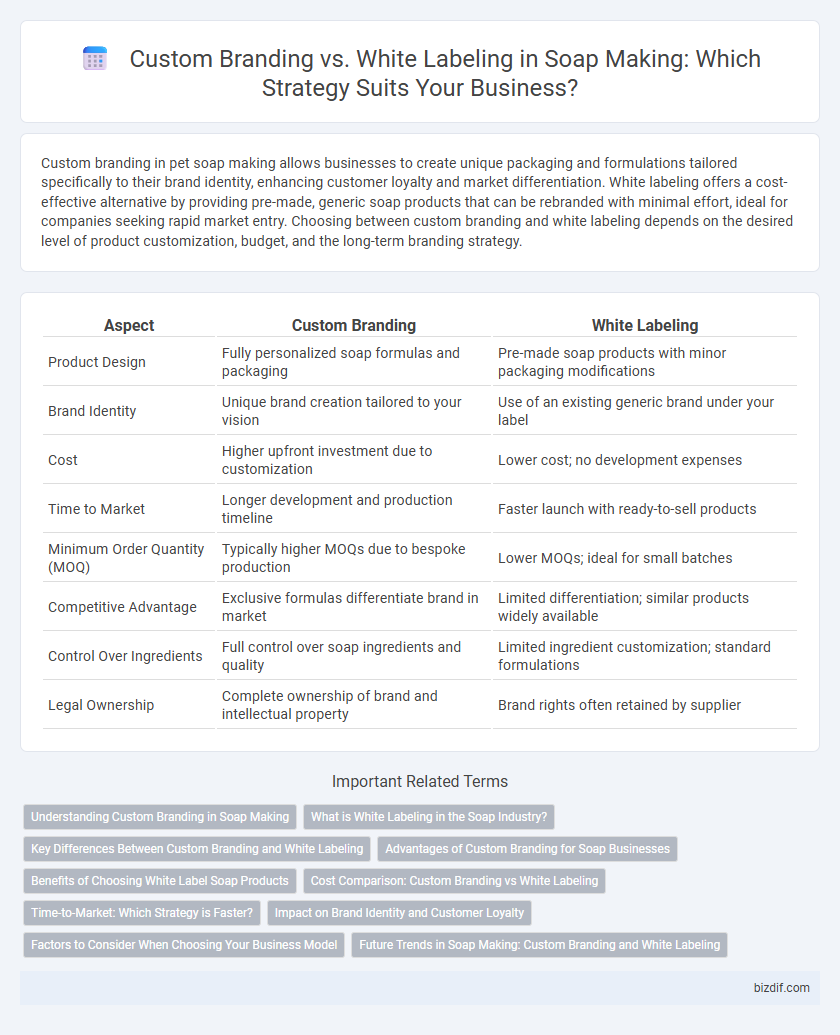Custom branding in pet soap making allows businesses to create unique packaging and formulations tailored specifically to their brand identity, enhancing customer loyalty and market differentiation. White labeling offers a cost-effective alternative by providing pre-made, generic soap products that can be rebranded with minimal effort, ideal for companies seeking rapid market entry. Choosing between custom branding and white labeling depends on the desired level of product customization, budget, and the long-term branding strategy.
Table of Comparison
| Aspect | Custom Branding | White Labeling |
|---|---|---|
| Product Design | Fully personalized soap formulas and packaging | Pre-made soap products with minor packaging modifications |
| Brand Identity | Unique brand creation tailored to your vision | Use of an existing generic brand under your label |
| Cost | Higher upfront investment due to customization | Lower cost; no development expenses |
| Time to Market | Longer development and production timeline | Faster launch with ready-to-sell products |
| Minimum Order Quantity (MOQ) | Typically higher MOQs due to bespoke production | Lower MOQs; ideal for small batches |
| Competitive Advantage | Exclusive formulas differentiate brand in market | Limited differentiation; similar products widely available |
| Control Over Ingredients | Full control over soap ingredients and quality | Limited ingredient customization; standard formulations |
| Legal Ownership | Complete ownership of brand and intellectual property | Brand rights often retained by supplier |
Understanding Custom Branding in Soap Making
Custom branding in soap making involves creating unique formulations, packaging, and labels tailored specifically to a brand's identity, enhancing consumer recognition and loyalty. Unlike white labeling, which uses pre-made products rebranded for resale, custom branding allows full control over ingredients, scents, and design, ensuring product differentiation in a competitive market. This approach supports brand storytelling and aligns the soap's attributes directly with business values and target audience preferences.
What is White Labeling in the Soap Industry?
White labeling in the soap industry involves purchasing pre-made soap products from manufacturers and selling them under your own brand name without altering the product formula or packaging design. This approach allows businesses to quickly enter the market with minimal product development costs and focus on marketing and distribution. White labeling contrasts with custom branding, which requires creating unique soap formulations and personalized packaging tailored to specific brand identities.
Key Differences Between Custom Branding and White Labeling
Custom branding in soap making involves creating unique formulations, packaging, and labeling tailored to a specific brand, allowing full control over product identity and customer experience. White labeling offers pre-made soap products that manufacturers rebrand and resell under their own label, enabling faster market entry with lower development costs. Key differences include originality in product creation, flexibility in design, and ownership of intellectual property rights.
Advantages of Custom Branding for Soap Businesses
Custom branding in soap making allows businesses to create unique product identities that resonate with targeted customer segments, increasing brand loyalty and market differentiation. It provides opportunities for personalized packaging, scent combinations, and marketing strategies tailored specifically to the brand's vision and consumer preferences. This tailored approach boosts perceived value and enables greater control over product quality and brand reputation compared to white labeling.
Benefits of Choosing White Label Soap Products
White label soap products offer significant advantages by allowing businesses to quickly enter the market with professionally crafted, high-quality formulations without the need for extensive research and development. This approach minimizes upfront costs and streamlines production timelines, enabling faster scalability and brand expansion. Additionally, white label soap manufacturing provides access to established supply chains and expert formulation, enhancing product reliability and customer satisfaction.
Cost Comparison: Custom Branding vs White Labeling
Custom branding in soap making involves higher upfront costs due to design, packaging, and marketing efforts tailored specifically to the brand, often requiring minimum order quantities that increase initial investment. White labeling offers a cost-effective alternative by using pre-existing soap formulations and packaging, significantly reducing product development expenses and allowing faster market entry. While custom branding demands higher capital, it provides unique market differentiation, whereas white labeling prioritizes budget efficiency and rapid scalability.
Time-to-Market: Which Strategy is Faster?
Custom branding in soap making requires longer development time due to tailored formulations and packaging design, often extending time-to-market by several weeks. White labeling offers a faster route as pre-formulated, ready-made soaps are simply rebranded, enabling companies to launch products within days. Brands prioritizing rapid market entry typically choose white labeling to minimize production delays and capitalize quickly on consumer trends.
Impact on Brand Identity and Customer Loyalty
Custom branding in soap making strengthens brand identity by allowing unique logos, packaging, and formulations that resonate deeply with target customers, fostering stronger emotional connections and trust. White labeling offers a quicker market entry but limits differentiation since products are generic, potentially weakening customer loyalty and long-term recognition. Investing in custom branding maximizes customer retention through personalized experiences that reflect a brand's core values and aesthetic.
Factors to Consider When Choosing Your Business Model
When choosing between custom branding and white labeling in soap making, consider factors such as control over product design, brand identity, and production costs. Custom branding offers full creative control and unique packaging but requires higher investment and longer development time. White labeling allows faster market entry with lower upfront costs, though it limits differentiation and brand exclusivity.
Future Trends in Soap Making: Custom Branding and White Labeling
Future trends in soap making emphasize the rise of custom branding, allowing artisans to create unique, tailored products that connect deeply with niche markets. White labeling remains popular for businesses seeking efficient market entry with pre-formulated soaps, but innovations in sustainable ingredients and personalized packaging are driving differentiation. Digital tools and eco-conscious consumer preferences are pushing both custom and white label soap makers to adopt transparency and bespoke branding strategies.
Custom Branding vs White Labeling Infographic

 bizdif.com
bizdif.com